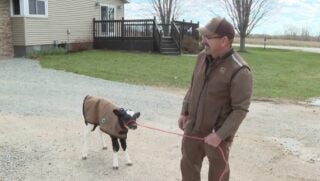On July 8, my father-in-law walked down to the sheep pasture to check on the flock, the same way he has for over 20 years. It was a beautiful summer morning, feeling much cooler after a spell of heat and humidity had just ended, but only one ewe greeted him. It was by the grace of God that she was there.
As he began checking fence to see where the sheep might have gone, he saw a sight straight out of our worst nightmares. He started to find the massacred remains of our family’s sheep. This wasn’t my family’s first go around with a wolf kill on the farm, so my father in-law knew what to do.
Less than two hours later, the U.S. Fish and Wildlife adjuster was out and began his investigation and, after finding tracks, was able to confirm it was a wolf kill.
Imagine waking up one morning and everything that you have worked towards for the last 30 years is gone. In a blink of an eye you have lost over 30 years of genetics, 30 years of blood, sweat, and tears. Just to be told that there is nothing you can really do about it except fill out some paperwork and wait for a small reimbursement that won’t equal the true value of the animals you lost.
How do you move on? How do you recover?
The days to follow this horrific event were tough to manage. We woke up to see the story spread across local, state, and national news outlets. The true pain and hurt came from reading all the comments made by others judging our ability to be farmers and what we should have done or how we could have prevented it. There were even some people denying this actually happened.
The news stations noted that we would be reimbursed for the value of our animals. Last time our ewes were killed, we had to wait over six months to receive compensation. I read comment after comment talking about our farm’s reimbursement — the problem is that while reimbursement is appreciated, it is only a fraction of the actual value of the animals. A typical ewe that is being sold to market is worth roughly $200, but that is pennies on the dollar when you factor in loss of potential offspring, time spent filling out paperwork and dealing with the loss, feed that has already been purchased or grown, meat that would feed our family, etc.
After the last wolf kill, it took months to be able to sleep through the night because we constantly worried about the safety of our livestock and family. I don’t anticipate being able to sleep with both eyes closed for many years.
Currently, gray wolves are listed as an endangered species and protected under federal regulation, so we have very limited options that are effective at protecting livestock from wolf kills. According to studies from the Wisconsin DNR, our state’s current wolf population is nearly three times the size of the population goal set for the state. It is time to return population management back to the Wisconsin DNR for the health of the wolves and the safety of our livestock and rural families like mine.
Even though our family has experienced a detrimental loss, we are not asking for wolves to be eliminated. We understand wolves have an important place in our ecosystem. What we are asking for is that gray wolves to be removed from the Endangered Species List so they can be appropriately managed and we have the ability to protect ourselves and our livestock. We hope that someday our young daughter can play outside, explore nature and do all the things we grew up doing without fear. That someday we can find restful sleep, that we can go on a vacation without the fear of what could happen if we are gone overnight.
My story is not unique to my family. There are other Wisconsin farm families dealing with these same challenges.
The U.S. Fish and Wildlife Service is accepting comments on delisting gray wolves from the Endangered Species List through Monday, July 15. Comments can be submitted online here.
Please take a few minutes to share your thoughts on why this needs to happen.
I have already shared my story and hope you will join me. If you don’t have a personal story to share, feel free to share mine. I don’t want my nightmare to also be yours.
Ashleigh Calaway serves as the District 8 Coordinator for Wisconsin Farm Bureau. Ashleigh and her husband, Josh, along with her Josh’s family, raise beef cattle and sheep in northern Wisconsin. They are also the proud parents of their young daughter, Alena.


